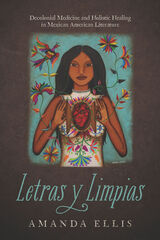2 books about Mexican American women healers

Águila
The Vision, Life, Death, and Rebirth of a Two-Spirit Shaman in the Ozark Mountains
María Cristina Moroles
University of Arkansas Press, 2024
In Águila: The Vision, Life, Death, and Rebirth of a Two-Spirit Shaman in the Ozark Mountains, María Cristina Moroles traces the path of her extraordinary life from the streets of Dallas to the wilderness of the Arkansas Ozarks, where she has resided for fifty years. Hailing from a large Indigenous and Mexican American family in Texas, Moroles apprentices herself to healers and shamans across the Americas as she follows the spiritual vision that leads her to establish a mountaintop sanctuary for women and children of color in a notoriously insular location in the Ozark Mountains. This is a survivor’s tale, and a back-to-the-lander’s tale, unlike any other. From early traumas to countercultural rebellion and profound spiritual awakening, Moroles recounts milestones that earn her the ceremonial names SunHawk and Águila, as she builds a sustainable community off the grid, atop a mountain otherwise uninhabited by human life. Águila tells the truth of one woman’s search for freedom and all women’s quest for dignity as it celebrates the healing powers of nature.
[more]

Letras y Limpias
Decolonial Medicine and Holistic Healing in Mexican American Literature
Amanda Ellis
University of Arizona Press, 2021
Letras y Limpias is the first book to explore the literary significance of the figure of the curandera within Mexican American literature. Amanda Ellis traces the significance of the curandera and her evolution across a variety of genres written by leading Mexican American authors, including Américo Paredes, Rudolfo Anaya, Gloria E. Anzaldúa, Manuel Munoz, ire’ne lara silva, and more.
Ellis explores the curandera in relationship to decoloniality, bioethics, and the topic of healing while recognizing the limitations and spiritual shortcomings of Western medicine. Ellis argues that our contemporary western health-care system does not know how to fully grapple with illnesses that patients face. Ellis reads the curandera’s perennial representation as an ongoing example of decolonial love useful for deconstructing narrow definitions of health and personhood, and for grappling with the effects of neoliberalism and colonialism on the health-care industry.
Letras y Limpias draws from Chicana feminist theory to assert the importance of the mindbodyspirit connection. Ellis conveys theoretical insights about the continual reimagining of the figure of the curandera as a watermark across Mexican American literary texts. This literary figure points to the oppressive forces that create susto and reminds us that healing work requires specific attention to colonialism, its legacy, and an intentional choice to carry forward the traditional practices rooted in curanderismo passed on from prior generations. By turning toward the figure of the curandera, readers are better poised to challenge prevailing ideas about health, and imagine ways to confront the ongoing problems that coloniality creates. Letras y Limpias shows how the figure of the curandera offers us ways to heal that have nothing to do with copays or medical professionals refusing care, and everything to do with honoring the beauty and complexity of any, every, and all humans.
Ellis explores the curandera in relationship to decoloniality, bioethics, and the topic of healing while recognizing the limitations and spiritual shortcomings of Western medicine. Ellis argues that our contemporary western health-care system does not know how to fully grapple with illnesses that patients face. Ellis reads the curandera’s perennial representation as an ongoing example of decolonial love useful for deconstructing narrow definitions of health and personhood, and for grappling with the effects of neoliberalism and colonialism on the health-care industry.
Letras y Limpias draws from Chicana feminist theory to assert the importance of the mindbodyspirit connection. Ellis conveys theoretical insights about the continual reimagining of the figure of the curandera as a watermark across Mexican American literary texts. This literary figure points to the oppressive forces that create susto and reminds us that healing work requires specific attention to colonialism, its legacy, and an intentional choice to carry forward the traditional practices rooted in curanderismo passed on from prior generations. By turning toward the figure of the curandera, readers are better poised to challenge prevailing ideas about health, and imagine ways to confront the ongoing problems that coloniality creates. Letras y Limpias shows how the figure of the curandera offers us ways to heal that have nothing to do with copays or medical professionals refusing care, and everything to do with honoring the beauty and complexity of any, every, and all humans.
[more]
READERS
Browse our collection.
PUBLISHERS
See BiblioVault's publisher services.
STUDENT SERVICES
Files for college accessibility offices.
UChicago Accessibility Resources
home | accessibility | search | about | contact us
BiblioVault ® 2001 - 2025
The University of Chicago Press









